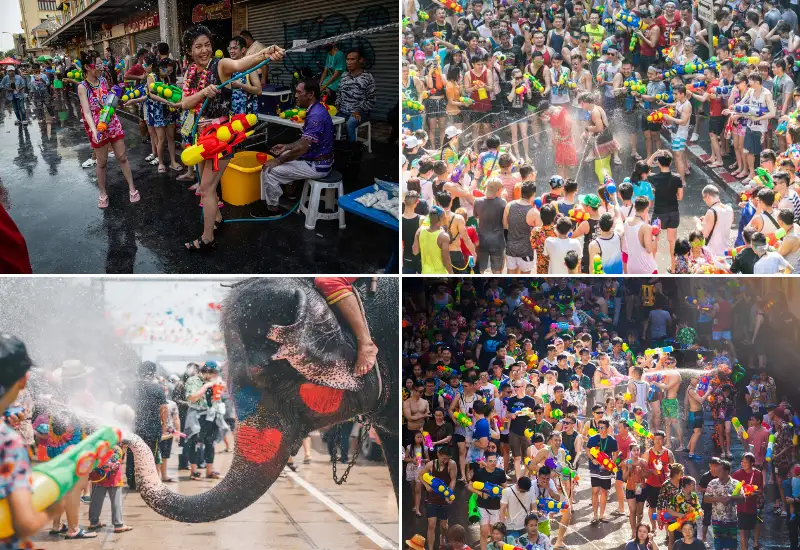Want to experience a vibrant festival where entire cities transform into colorful playgrounds? Thailand’s Songkran Water Festival is the answer. More than just a way to beat the heat, Songkran is a traditional celebration steeped in cultural significance. Let’s dive into what makes this festival so special!
What is Songkran?
Songkran is Thailand’s traditional festival, regarded as the Thai New Year. The word “Songkran” comes from Sanskrit, meaning “transition” or “change,” symbolizing the shift from the old year to the new. It’s a time for Thais to honor elders, pray for good fortune, and engage in water-splashing fun to cool off in the summer heat.
Renowned worldwide, Songkran is celebrated for its lively atmosphere, enthusiastic water fights, and participation from both locals and international tourists.

When does Songkran take place?
Songkran occurs annually from April 13 to 15. In some regions, festivities may extend to 5–7 days. The three main days carry distinct meanings:
- April 13: Known as “Maha Songkran Day,” it marks the end of the old year in the Thai calendar. People clean their homes and prepare for traditional rituals.
- April 14: Called “Wan Nao,” this day involves charitable acts, preparing food offerings for monks, and participating in religious ceremonies.
- April 15: “Wan Payawan” is the first day of the new year. People pour scented water on Buddha statues to pray for blessings and good luck.
Activities during Songkran
The Songkran Water Festival, held from April 13–15, features a mix of traditional and modern activities. Here are the highlights:
Bathing Buddha and praying
- Locals visit temples to pour scented water on Buddha statues for good fortune.
- They perform rituals of pouring water on monks’ and elders’ hands to show respect.
Water splashing – The most exciting activity
- Locals and tourists use buckets, water guns, and hoses to splash water on each other.
- Thais believe water washes away bad luck and brings prosperity.
- Water fights take place on streets nationwide, especially in Bangkok (Khao San Road, Silom), Chiang Mai (Thapae Gate), Pattaya, and Phuket.
Parades and art performances
- Vibrant parades feature decorated floats, Buddha statues, and traditional Thai dances.
- Music performances and cultural shows showcase Thai heritage.
Folk games and cuisine
- Traditional games include tug-of-war, boat races, and rope jumping.
- Food festivals offer iconic dishes like Som Tum (papaya salad), Pad Thai, and mango sticky rice.
Releasing animals and charitable acts
- Locals release fish or turtles into rivers as a merit-making ritual.
- Donations of money or goods to the poor and participation in volunteer activities are common.
Songkran is not just about fun; it carries profound spiritual meaning, helping people start the new year with joy and peace.
Significance of Songkran
Beyond merriment, Songkran holds deep cultural and spiritual value. It’s a time to strengthen family bonds, express filial piety, and embrace the joy of a fresh start.
Songkran has become an iconic symbol of Thai culture, attracting millions of tourists annually. If you’re eager to experience Thailand’s vibrant energy and rich traditions, Songkran is the perfect time to visit the Land of Smiles! Check out more interesting articles in the Thailand news!
